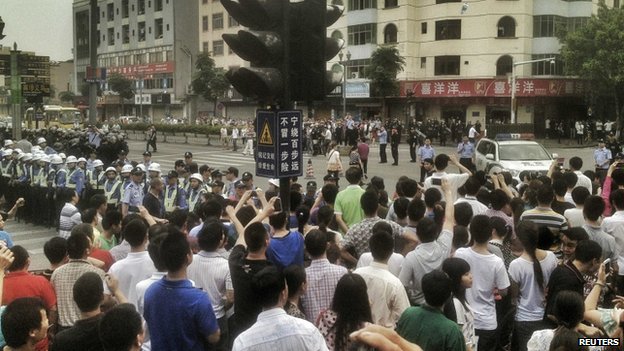The BBC reports that police in China have formally charged a labor activist with disturbing public order following the unprecedented Yue Yuen shoe factory strikes which led a local government to vouch for worker compensation:
On Thursday, police detained Lin Dong and another activist, Zhang Zhiru, who was released a day later.
A majority of the workers have reportedly returned to the factories. However, details surrounding their return were not immediately clear.
Strikes are common in the city of Dongguan one of China’s main manufacturing hubs, says the BBC’s Martin Patience in Beijing.
But the scale and duration of this walk-out would have worried the authorities, fearing it could trigger wider social unrest, our correspondent adds. [Source]
Jonathan Sullivan and Samantha Hoffman at SCMP say workers’ strikes will “continue to plague China” unless officials and business leaders ditch the “growth at any cost” attitude that has subjected workers to 16-hour per day shifts:
Across the country, inequality is spiralling and there is a yawning gap between employment laws and workers’ rights and the actual behaviour of the state and businesses. With improved internet accessibility, particularly the mobile internet that allows the poor to get online, and the admirable work of civic groups, rights lawyers and bloggers, there is much greater awareness of workers’ rights and the determination to have them recognised.
The ubiquity of popular protest in China, on the ground and in cyberspace, is one of the most remarkable developments of the past decade. Nationwide, there have been clashes over pensions, lay-offs, corruption, land seizures, taxes and pollution. And direct action is no longer merely a last resort for the rural poor: “Not-in-my-backyard” protests over plans to build polluting chemical factories have recently brought the middle classes onto the streets of the bigger cities in huge numbers.
A decade or so ago, the government recorded 87,000 “mass incidents”, riots, demonstrations and the like with more than 100 participants. By 2011, researchers estimated that this number had more than doubled. Worried about encouraging further unrest, the government stopped regularly releasing exact figures. [Source]
At Al Jazeera, William Hurst argues that the strikes may be “a harbinger of China’s meaningful transition to a new economic model, one that may undermine its position as a contract manufacturer to the world but also may help it achieve a more equitable society and sustainable path to economic growth, with significant implications for the rest of the world’s workers, firms and consumers.”
Listen also to a report via CBC radio about the protest’s stark reminder of China’s upcoming retirement crunch.







